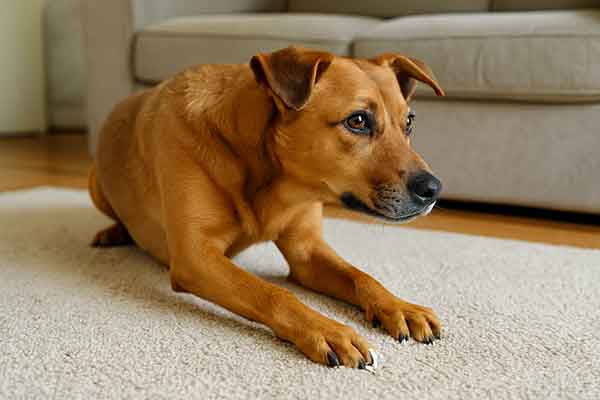Why Does My Dog Scratch the Carpet? Causes and Solutions
Does your dog frequently scratch or dig at the carpet, especially before lying down or when you’re not around? You’re not alone. Many dog owners find themselves asking, “Why does my dog scratch the carpet?” While the behavior might seem random—or even destructive—it often has a root cause related to instincts, emotions, or environmental factors. In this article, we’ll uncover the common reasons behind carpet scratching, when it’s normal, when it’s a problem, and how to redirect your dog’s behavior in a healthy way.
Table of Contents
- Is It Normal for Dogs to Scratch the Carpet?
- Why Do Dogs Scratch the Carpet?
- When to Be Concerned About Carpet Scratching
- How to Stop Dogs from Scratching the Carpet
- Healthy Alternatives to Carpet Scratching
- Should You Call a Vet or Dog Trainer?
- FAQ
Is It Normal for Dogs to Scratch the Carpet?
Yes, in many cases, carpet scratching is a normal dog behavior. Dogs have inherited digging instincts from their wild ancestors, who would dig to create comfortable resting spots, hide food, or prepare for giving birth. Today, that behavior may transfer to rugs, carpets, or even furniture inside your home.
However, if the scratching becomes obsessive, destructive, or frequent, it may be a sign that something else is going on—whether behavioral, medical, or emotional.
Why Do Dogs Scratch the Carpet?
There are several potential reasons why your dog might be scratching or digging at the carpet. Understanding the underlying cause is key to correcting the behavior.
1. Instinctual Nesting Behavior
Dogs naturally like to prepare a sleeping area before settling down. This behavior is known as “nesting,” and you might notice it most often before bedtime or naps. Scratching helps them create a “comfortable spot,” even if they’re indoors on carpet.
2. Boredom or Lack of Mental Stimulation
If your dog is left alone for long periods or isn’t getting enough mental stimulation, carpet scratching may be a sign of boredom. It becomes a way to release pent-up energy or occupy their mind.
3. Anxiety or Stress
Dogs experiencing separation anxiety, noise phobias (like thunder), or changes in the home environment may use repetitive behaviors like carpet scratching to self-soothe.
4. Attention-Seeking
If your dog learns that scratching the carpet gets your attention—even negative attention like shouting—they may repeat the behavior for engagement.
5. Exploring Smells or Hiding Objects
Dogs have an incredibly powerful sense of smell. If something has been spilled or if a scent is lingering in the carpet fibers, your dog may scratch to investigate. Some dogs also attempt to “bury” toys or treats in the carpet.
6. Discomfort or Medical Issues
Occasionally, dogs scratch due to discomfort, pain, or neurological issues. If your dog also licks, bites, or shows other signs of stress, it’s worth consulting your vet.
7. Habitual or Compulsive Behavior
When scratching becomes excessive and appears compulsive, it may be a sign of obsessive-compulsive behavior (OCD). This often requires professional behavioral support.

When to Be Concerned About Carpet Scratching
Occasional scratching is typically harmless. However, seek help if:
- Scratching occurs for extended periods or multiple times daily
- Your dog damages furniture, rugs, or flooring
- The behavior escalates or becomes compulsive
- There are other signs of anxiety, like whining or pacing
- Your dog is scratching along with licking, chewing, or excessive grooming
These could point to deeper issues that require training or medical evaluation.
How to Stop Dogs from Scratching the Carpet
Once you’ve ruled out medical causes, you can begin behavior modification and redirection.
1. Increase Exercise and Mental Stimulation
A tired dog is a well-behaved dog. Add more daily walks, playtime, or puzzle toys to help reduce excess energy that might fuel carpet scratching.
2. Use Positive Redirection
Interrupt scratching with a command like “Leave it” and redirect your dog to a toy, bed, or chew. Praise them when they engage with the alternative.
3. Reinforce Calm Behavior
Reward your dog when they lie down calmly without scratching. This teaches them that quiet, relaxed behavior brings attention and treats.
4. Create a Designated Resting Area
Provide a cozy bed, crate, or mat where your dog can relax. Use calming scents or music to make it appealing.
5. Use Deterrents Carefully
You can try using pet-safe carpet deterrent sprays or cover the area temporarily with a rug or mat to reduce access. Avoid punishing your dog—it may worsen anxiety.
Healthy Alternatives to Carpet Scratching
Provide your dog with acceptable outlets for digging or nesting behavior:
- Digging boxes (for outdoor play)
- Blankets or old towels for them to paw at before lying down
- Enrichment toys like treat dispensers or snuffle mats
- Comfort beds that simulate den-like coziness
Should You Call a Vet or Dog Trainer?
Consider professional help if:
- Your dog’s scratching is paired with signs of distress
- There are physical symptoms like licking, chewing, or sores
- Behavior persists despite redirection and training
A vet can rule out health conditions, while a certified dog trainer or behaviorist can identify environmental or emotional triggers and provide structured solutions.
FAQ
Is carpet scratching normal in puppies?
Yes. Puppies explore their environment with their paws and may scratch carpets out of curiosity or as part of their nesting behavior. It often decreases with maturity and training.
Why does my dog scratch the carpet and then lay down?
This is usually instinctual nesting. Your dog is simply creating a “comfortable spot” to lie on—similar to how wolves prepare bedding in the wild.
Should I punish my dog for scratching the carpet?
No. Punishment may increase anxiety and worsen the behavior. Instead, use redirection and reward calm, appropriate actions.
Can carpet scratching damage my home?
Yes, especially if it becomes frequent or aggressive. Carpets can fray, and wooden floors beneath may be scratched. Early intervention helps prevent damage.
Does carpet scratching mean my dog has anxiety?
Not always. Occasional scratching is normal, but if it’s repetitive or paired with pacing, barking, or destruction, anxiety could be a factor.
Conclusion
So, why does my dog scratch the carpet? It could be due to instincts, boredom, stress, or even a medical issue. The key is to observe the context, identify triggers, and respond with patience, structure, and care. Whether it’s providing enrichment, increasing exercise, or seeking professional help, there are many ways to redirect this behavior in a healthy direction.
With the right approach, you can protect your carpets—and more importantly, support your dog’s physical and emotional well-being.


